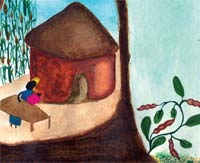Introduction | How we work | Where we work
 GCP links basic science with applied research through a broad network of plant scientists from diverse backgrounds, working at CGIAR Centres, in academia and other research institutes, and in regional and country research programmes. This network generates knowledge, explores new allelic diversity and develops practical tools such as molecular markers for desirable traits to increase the efficiency of plant breeding in developing countries. The overall goal is to produce better crop varieties by forging and nurturing partnerships in modern crop breeding for food security.
GCP links basic science with applied research through a broad network of plant scientists from diverse backgrounds, working at CGIAR Centres, in academia and other research institutes, and in regional and country research programmes. This network generates knowledge, explores new allelic diversity and develops practical tools such as molecular markers for desirable traits to increase the efficiency of plant breeding in developing countries. The overall goal is to produce better crop varieties by forging and nurturing partnerships in modern crop breeding for food security.
As such, GCP’s work is all about partnerships and networking, bringing together players in crop research that may otherwise never have worked together.
A typical GCP project brings together partners from CGIAR, developing countries and developed countries. These partnerships have worked well, and borne good fruit.
For example, in GCP Phase I, screening a diverse panel of sorghum lines and landraces, partners at EMBRAPA in Brazil and Cornell University in the United States successfully identified contrasting genotypes for aluminium tolerance and cloned a major gene for aluminium toxicity resistance in that important crop. Elite alleles for this gene have been identified and introduced into Brazil’s elite sorghum and efforts are already underway to transfer this resistant Brazilian allele into African germplasm in GCP Phase II.
 GCP has engendered a vibrant community that has cultivated and nurtured extensive and effective partnerships, and established an even broader network of R&D participants to support and help realise GCP objectives. The first GCP External Programme and Management Review conducted towards the end of Phase I (2007) captures this ‘people’ essence of GCP in its conclusion:
GCP has engendered a vibrant community that has cultivated and nurtured extensive and effective partnerships, and established an even broader network of R&D participants to support and help realise GCP objectives. The first GCP External Programme and Management Review conducted towards the end of Phase I (2007) captures this ‘people’ essence of GCP in its conclusion:
"Perhaps the most important value of GCP thus far, is the opportunities it has provided for people of diverse backgrounds to think collectively about solutions to complex problems and in the process to learn from one another."
Building a solid community is a major impact indicator: by the end of Phase II, GCP aims to facilitate and empower a solid community of developing-country breeders who routinely use molecular breeding to improve crop productivity and contribute to food security and poverty alleviation in the developing world.
 Where in the world is GCP? Pinpoint GCP's partners on our interactive map.
Where in the world is GCP? Pinpoint GCP's partners on our interactive map.


